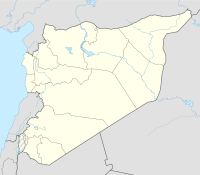| Alternative name | Tall Munbāqa, Ekalte |
|---|---|
| Location | Tabqa, Syria |
| Coordinates | 36°13′8.97″N 38°7′53.89″E / 36.2191583°N 38.1316361°E |
| Type | Tell |
| Site notes | |
| Archaeologists | Winfried Orthmann, Alfred Werner Maurer |
| Condition | Ruins |
| Public access | Yes |
Tall Munbāqa or Mumbaqat, the site of the Late Bronze Age city of Ekalte, is a 5,000-year-old town complex in northern Syria now lying in ruins. The ruins are located on a steep slope on the east bank of the upper course of the Euphrates. In the 3rd and 2nd millennium BC the city was an important city-state in the region. Due to the establishment of the Tabqa Dam at Al-Thawrah, 35 kilometers west of Raqqa, the city ruins are partially flooded today by Lake Assad. Situated high above the steep drop of the eastern shore, Tall Munbāqa is still preserved. The Bronze Age site of Tell Hadidi (Azu) lies 5 kilometers to the north. The city-god of Ekalte was Baʿlaka.[1] There are known to have been four temples in the city, three on the high ground by the Euphrates and one at a city gate.[2]
- ^ Torrecilla, Eduardo, "The Dwellers of Azû: A Study on the Tall Ḥadīdī Society and Chronology", Altorientalische Forschungen, vol. 46, no. 1, pp. 33-50, 2019
- ^ Otto, Adelheid, "Archaeological Evidence for Collective Governance along the Upper Syrian Euphrates during the Late and Middle Bronze Age", Organization, Representation, and Symbols of Power in the Ancient Near East: Proceedings of the 54th Rencontre Assyriologique Internationale at Würzburg 20–25 Jul, edited by Gernot Wilhelm, University Park, USA: Penn State University Press, pp. 87-100, 2012
